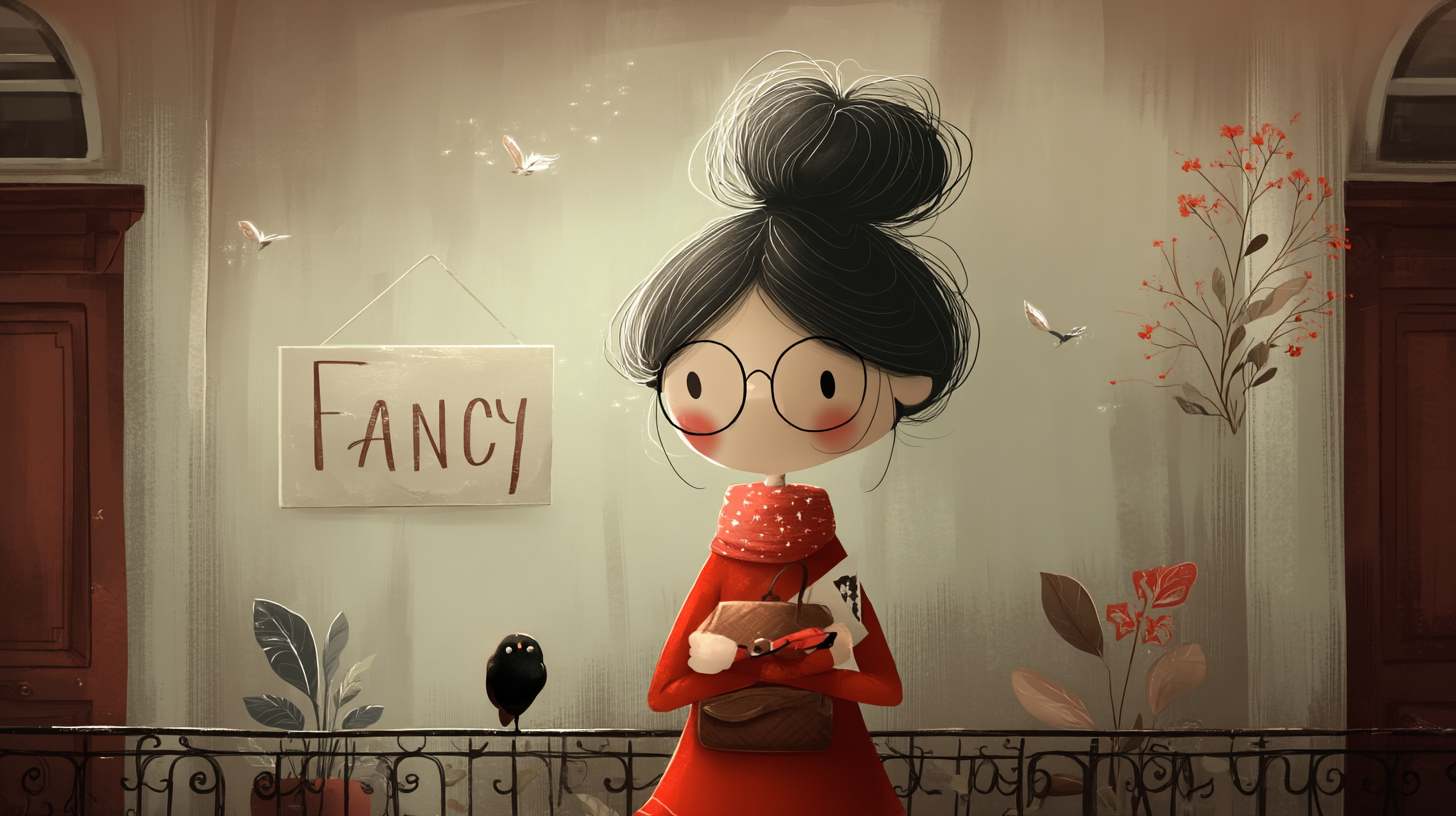“Fancy” means stylish, want to do something, or a short strong liking.
「fancy」は「おしゃれ」「~したい」「気まぐれな好き」という意味の単語です。
以下は英単語 “fancy” に関するストーリー型学習コンテンツです。まずは大枠の意味を理解して最後の文章で確認しましょう。
主な意味(main meaning)
| 品詞 | 意味 | 発音記号 | 例文 |
|---|---|---|---|
| 形容詞 | 高級な・おしゃれな | /ˈfæn.si/ | She wore a fancy dress to the party. |
| 動詞 | ~したい気がする・~が好きだ | /ˈfæn.si/ | Do you fancy going for a walk? |
| 名詞 | 空想・気まぐれな好み | /ˈfæn.si/ | It was just a passing fancy. |
語源(etymology)
「fancy」は「fantasy(空想)」の短縮形で、ギリシャ語の「phantasia(想像)」に由来します。「頭の中で思い描くこと」が語源の核です。
類義語(synonyms)
| 類義語 | 例文 |
|---|---|
| stylish | She always wears stylish clothes. |
| luxurious | They stayed in a luxurious hotel. |
| elegant | The room had an elegant design. |
| desire (動詞の意味に近い) | He desires to become a pilot. |
| whim (名詞の意味に近い) | On a whim, they went to the beach. |
反義語(antonyms)
| 反義語 | 例文 |
|---|---|
| plain | He wore a plain T-shirt. |
| dislike | I dislike going to crowded places. |
コロケーション(collocations)
| コロケーション | 例文 |
|---|---|
| fancy restaurant | We had dinner at a fancy restaurant. |
| fancy dress | She bought a fancy dress for the event. |
| fancy car | He drives a fancy car. |
| fancy seeing you here | Fancy seeing you here—what a surprise! |
| take a fancy to | She took a fancy to the puppy. |
2項表現(binomials)
| 2項表現 | 例文 |
|---|---|
| wine and dine | They love to wine and dine at fancy places. |
| ups and downs | Every fancy job has its ups and downs. |
英語ストーリー(english story)
A Fancy Evening
Emma had just started her new job at a travel agency. One Friday evening, her coworkers invited her to a fancy restaurant to celebrate a successful project. Emma didn’t usually go to luxurious places, but she thought, “Why not? I fancy trying something new.”
The restaurant had elegant lighting and soft music. Emma wore her fancy dress that she had saved for special occasions. “You look so stylish,” said her manager, smiling.
As they wined and dined, Emma felt more relaxed. She started talking about her dream to visit Italy. “That’s not just a passing fancy, is it?” joked one coworker.
“No, I really desire to go there someday,” Emma replied.
They laughed and shared stories. Even though there were some ups and downs at work, moments like these made it all worth it. On her way home, Emma looked at the stars and thought, “I’m glad I took a fancy to this job.”
和訳
華やかな夜
エマは旅行代理店で新しい仕事を始めたばかりだった。ある金曜日の夜、同僚たちがプロジェクトの成功を祝うために**fancy restaurant(高級レストラン)**に誘ってくれた。エマは普段、luxurious(ぜいたくな)場所には行かないが、「たまにはいいか」と思って、「新しいことをfancy(したいと思う)」と思った。
レストランは**elegant(上品な)な照明と柔らかな音楽が流れていた。エマは特別な日のためにとっておいたfancy dress(おしゃれなドレス)を着ていた。「とってもstylish(おしゃれ)**ね」とマネージャーが微笑んだ。
食事を楽しみながら(wined and dined)、エマはリラックスしていった。彼女はイタリアに行きたいという夢を語った。「それってただの**passing fancy(気まぐれ)**じゃないの?」と同僚が冗談を言った。
「ううん、私は本当にそこに行きたいと思っているの(desire(強く望む))」とエマは答えた。
笑いながら話し、楽しい時間を過ごした。仕事には**ups and downs(浮き沈み)があるけれど、こんな瞬間があるから頑張れる。帰り道、星空を見上げながらエマは思った。「この仕事をfancy(気に入って)**よかった。」
Q&A
Q: 「fancy」と「stylish」の違いは?
A: 「fancy」は見た目が豪華・高級というニュアンスがあり、見せびらかすようなイメージを含みます。一方で「stylish」はセンスが良くて洗練されているという意味で、上品さやモダンな印象を与える言葉です。
Q: 「fancy」と「luxurious」はどう違うの?
A: 「fancy」は見た目やデザインが派手・目を引く場合に使われ、「luxurious」は本当に高価で快適なものに使います。たとえば、見た目が派手でも安価な物は「fancy」だが、実際に上質で高級なら「luxurious」となります。
Q: 「fancy」と「elegant」の違いは?
A: 「fancy」は装飾が多く、派手な感じがある一方で、「elegant」はシンプルで洗練された美しさを指します。「fancy」は派手さ、「elegant」は上品さが特徴です。
Q: 「fancy」と「desire」はどう使い分けるの?
A: 「fancy」は「ちょっと~したいな」という軽い気持ちのときに使い、「desire」は「強く望む」ときに使います。たとえば、「チョコが食べたいな」は「fancy chocolate」、「医者になりたい」は「desire to become a doctor」となります。
Q: 「fancy」と「whim」の違いは?
A: どちらも「気まぐれ」な意味ですが、「fancy」は自分の好みや空想に近く、「whim」は思いつきや衝動に近い意味です。たとえば、「急に旅行に行きたくなった」は「on a whim」で表されます。
Q: 「fancy restaurant」と「stylish restaurant」の違いは?
A: 「fancy restaurant」は高級で豪華な内装や料理のある店を指し、「stylish restaurant」はインテリアがモダンでセンスの良い店を指します。価格よりも雰囲気の違いに注目します。
Q: 「fancy dress」と「elegant dress」の違いは?
A: 「fancy dress」は装飾が多く派手なドレス、「elegant dress」は上品で控えめな美しさのあるドレスです。ファッションショー向けが「fancy」、結婚式向けが「elegant」という感じです。
Q: 「fancy seeing you here」と「nice to see you here」は同じ意味?
A: 意味は似ていますが、「fancy seeing you here」は思いがけず誰かに会った驚きをこめたカジュアルな表現です。「nice to see you here」は単純に会えてうれしいという丁寧な言い方です。



コメント